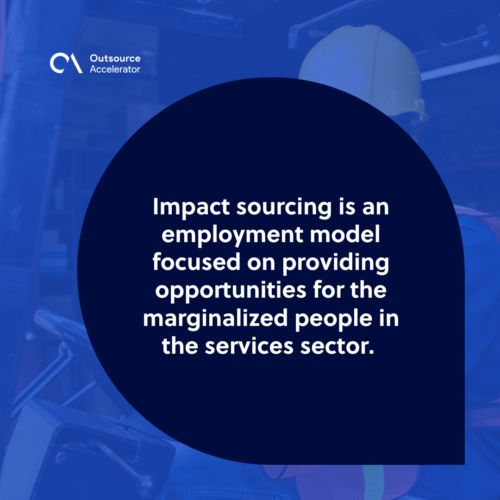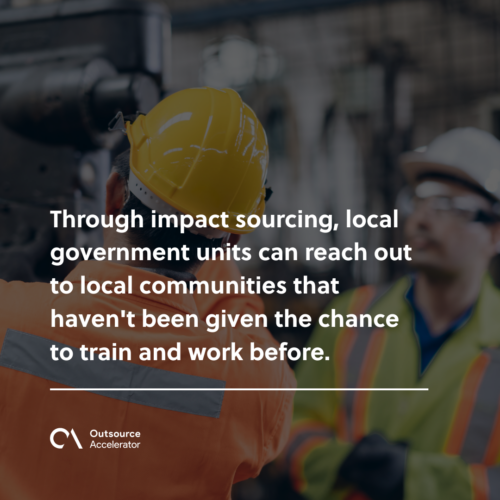What is impact sourcing?

As more businesses champion inclusivity by upholding shared values and corporate social responsibility, more and more organizations are turning to impact sourcing.
Impact sourcing is a rising business practice that delivers not only positive financial results but also great social impact. Find out more about it and how impact sourcing can benefit your business in this guide.
Impact sourcing defined
Impact sourcing is an employment model focused on providing opportunities for the marginalized people in the services sector.
This sourcing model provides new offerings to clients in search of innovation and sustainability. It also aims to provide employment mostly through IT solutions and business process outsourcing (BPO).
Impact sourcing provides businesses more comprehensive access to untapped pools of talent and newly discovered manpower skills. At the other end of the spectrum, it also helps deliver learning and career development opportunities to disadvantaged employees who have limited resources.
To create impact, companies should prioritize sustainable development programs and solutions. This could mean many things—from shifting focus to local employment to empowering marginalized people.

How can impact sourcing benefit your business?
Businesses that perform impact sourcing believe that this organizational strategy is not only about reducing costs. It is also about creating genuine social change and impact on the lives of many people.
Here are some of the major benefits that impact sourcing can offer your organization:
Save on costs
BPO is an ever-expanding industry, and it has been proven to provide opportunities to many developing countries. However, BPO service providers also encounter unforeseen challenges related to costs and staffing.
Impact sourcing offers a solution to this with a higher-quality workforce. Impact workers are known to have higher engagement and lower churn rates.
Labor costs for impact workers are also often lower than the average in-house and offshore workers.
Hire disadvantaged yet talented people
Last 2019, for example, the Philippines’ Department of Information and Communication Technology (DICT) launched a new skills training program called Rural Impact Sourcing (RIS).
The project aims to provide digital access and skills training to underserved sectors of the community. This project will in turn give employees skills and knowledge that will benefit them and their local communities.
Through impact sourcing, local government units can reach out to local communities that haven’t been given the chance to train and work before.
This will counterbalance the lack of talent supply and even lower unemployment rates among the labor force.
Reliable service delivery
Companies that conduct impact sourcing are confident in lowering the risk of service delivery. This may include lack of talent, data security, or errors tied to infrastructure.
Organizations that employ this model ensure that before delivering a service, all employees have been properly trained and oriented on skills development.
With the help of skills and training programs for workers, businesses have appropriate skills competencies and behavioral guides. This way, risks are closely monitored and mitigated.
Great social impact
Socially responsible sourcing not only benefits employers and providers. It offers greater employment access to underserved members of society. It provides millions of people with decent-paying jobs and skills development.
Impact sourcing with social responsibility improves a country’s economic status and the lives of the individuals employed, as well as their communities.

Sourcing with impact
With innovative sourcing models, more and more businesses are embracing shared values and a more socially responsible form of employment.
Impact sourcing can significantly change a country’s social and economic outlook by empowering its people. It’s more reason for leaders worldwide to rethink and reshape the role they can play in bringing opportunity to underprivileged communities.
If the goal is to create a genuine social impact on the lives of marginalized people, businesses should start rethinking their purpose. Augmenting solutions on local industries, manpower, and decent jobs should be on top of their core goals.







 Independent
Independent




